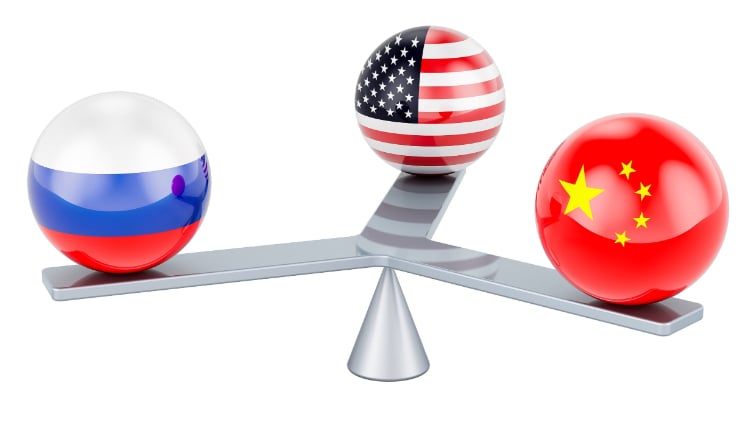News from Ukraine, China and the United States last week again reminded me that we are going into a new world system where no country will dominate and the need for wise diplomacy to prevent war is greater.
As we near the one-year anniversary of Russia’s invasion of Ukraine, it more obvious than ever that Russia is a declining power. Putin’s Russia could not conquer Ukraine despite Russia’s population being three times the size of Ukraine’s and its economy almost ten times bigger. Russian technology and organization are inferior and corruption in its system is terrible.
Worse for Russia, its population is declining – it dropped by a million in 2021 and by another half million in the first part of 2022. Younger, educated workers fleeing the war in 2022 is part of the reason for the decline. Putin will have huge difficulty fixing these problems. Probably he cannot.
Although Washington is busy with the Ukraine war, most American analysts focus not on Russia but instead on China. Last week we saw also an important sign of growing Chinese weakness: China’s population decreased for the first time since 1961. The decrease was only 850,000 from a population of 1.4 billion, but the population will continue to shrink.
A United Nations report last year estimated China’s population will decrease by 109 million by 2050; a report from the Shanghai Academy of Social Sciences anticipates China’s population will fall to 600 million by the end of the century.
As the population decreases, the labor force also will shrink and at the same time the number of retired workers in China will grow. Economic growth which came from abundant, cheap workers will slow, tax revenues will decrease and the Chinese government will have to spend more for pensions and health care. Although Beijing can spend much on the military now, in the long-term it will have fewer financial resources for its military.
The Americans cannot celebrate, however. Last week the extreme right-wing of the Republican Party in the House of Representatives threatened to block the Treasury Department from borrowing more money. Without more borrowing, the Treasury must reduce spending for civilian and military programs. At the same time, interest rates on American bonds will soar and, in the end, we will see a major shock to the American and world economy.
It is amazing what chaos twenty hardline conservative members of Congress could do. However, their primary concern is justified. The Chinese will have to worry about paying for pensions and health care, but so does the United States because American government statistics show that the number of Americans over the age of 65 will almost double to 95 million by 2060. Already pensions and health care eat half the American annual budget.
Probably the Treasury Department can escape a major financial crisis until early summer so there is still time for the Congress and the President to find a solution.
Even if we avoid a financial crisis in 2023, America still has a fundamental financial weakness as its society ages. It is hard to see how in the long-term the American military budget can continue to eat more than one-fourth of our government budget with money borrowed from American and international capital networks.
American, Chinese or Russia power will not dominate the future world like the Americans after the collapse of the Soviet Union. Instead, other rising powers will have wide space to maneuver and negotiate.
India, for example, will soon have the largest population of any country in the world. (As historian Niall Ferguson has written, population alone is not an indicator of global power. Indonesia has the world’s fourth largest population, but it is not the world’s fourth power.)
Some international companies already are avoiding China and putting their investment projects in other countries like India; some economists call this changing supply change “reglobalization.”
At the same time, Russia and China have provoked Europeans and Japan to increase the size of their militaries. They want close American military alliances against the Russian and Chinese threats, but at the same time they will use the World Trade Organization to block America-first trade policies.
China is buying more Iranian oil and the Indian (and Turkish) policy to maintain good political and commercial relations with Russia despite American unhappiness are more examples of the emerging multipolar world system.
Putin erred when he thought he could exploit the divisions in this new system to capture Ukraine. He expected more help from China and less unity in the West.
His misunderstanding shows that changes in global power balances, or just a mistaken perception of a change in relative power, will raise the risks of war and emphasizes the requirement for accurate intelligence and wise diplomacy to maintain global balances and stability.





